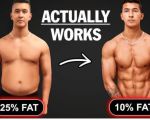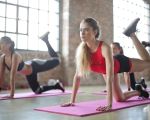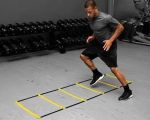How to Get Started with a Gym Membership as a Beginner
Starting your fitness journey can feel like a daunting task, especially if you've never stepped foot in a gym before. But trust me, the first step is always the hardest. As someone who was once a beginner myself, I know how overwhelming it can be to navigate the world of gyms and fitness routines. However, with a little guidance and a clear plan, you can make the most of your gym membership and see real results. In this article, I’ll take you through everything you need to know to get started with a gym membership as a beginner in the U.S.
1. Choosing the Right Gym for You
Before you sign up for any gym membership, it’s important to find the right gym for your needs. Not all gyms are created equal, and the best one for you will depend on your goals, location, and preferences. Here’s what you should consider when choosing a gym:
- Location: Pick a gym that is conveniently located. Whether it's close to your home or work, you want to make sure it's easy to get there so you can stick to your workout routine.
- Equipment: Does the gym have the equipment that suits your fitness goals? If you're looking to build muscle, check for a variety of free weights and machines. If you're into cardio, ensure there are enough treadmills, stationary bikes, or rowing machines.
- Atmosphere: The environment of the gym is key to your motivation. Some gyms may feel more social, while others may feel more focused on intense training. Visit the gym to get a feel for its culture before committing.
- Budget: Gym memberships come in all price ranges. Make sure the gym you choose fits within your budget while offering the amenities and services you need.
- Hours of Operation: If you have a busy schedule, choose a gym that offers flexible hours. Some gyms are open 24 hours, which can be a huge advantage for those with unpredictable routines.
2. Understanding Your Gym Membership
Once you've found the right gym, it's time to understand what your membership entails. Different gyms offer various membership plans, so make sure you fully understand what you're signing up for. Common membership options include:
- Month-to-Month Membership: This gives you flexibility without a long-term commitment. However, the monthly fee might be higher.
- Annual Membership: Paying upfront for the whole year often comes with a discount. This plan is best for those who are serious about working out regularly.
- Family or Group Memberships: Many gyms offer discounts for families or groups. If you're planning on working out with a friend or family member, this can be a cost-effective option.
- Personal Training Add-Ons: If you’re a beginner and need guidance, you may want to sign up for personal training sessions. These usually cost extra, but having a trainer can be invaluable, especially when you're just starting out.
3. Setting Realistic Fitness Goals
Setting goals is a crucial part of any fitness journey. But as a beginner, it’s important to set realistic and achievable goals. Start small and gradually increase the difficulty of your workouts as you progress. Here are a few tips to help you set effective goals:
- Be Specific: Instead of vague goals like "I want to get fit," aim for more specific targets, such as "I want to lose 10 pounds in 2 months" or "I want to be able to run a 5K." Specific goals are easier to track and measure.
- Make Them Measurable: Use numbers to track your progress. This could be the number of days you work out per week, the amount of weight you can lift, or the number of steps you take each day.
- Set Time Frames: Giving yourself a timeframe to reach your goals creates a sense of urgency and helps keep you accountable.
4. Creating a Workout Routine
One of the most common mistakes beginners make is not having a clear workout plan. When you’re just starting out, it’s easy to get lost in the sea of gym equipment and exercises. A structured workout routine will help you stay focused and maximize your time at the gym. Here’s a simple beginner’s workout routine:
- Cardio: Start with 20-30 minutes of cardio, such as running, cycling, or using the elliptical machine. Cardio helps improve your endurance and burn fat.
- Strength Training: Incorporate strength training exercises, like squats, lunges, push-ups, and dumbbell exercises. Aim for full-body workouts at first, focusing on compound movements that work multiple muscle groups.
- Rest Days: Don't forget to rest! Your muscles need time to recover, so plan for 1-2 rest days per week.
5. Staying Motivated
Motivation can be one of the biggest challenges when starting at the gym. Some days, it will feel like you have no energy or drive to go. That’s normal! Here are some tips to stay motivated:
- Track Your Progress: Keep a fitness journal or use a fitness app to track your workouts, nutrition, and progress. Seeing improvements, no matter how small, can help you stay motivated.
- Find a Workout Buddy: Having someone to work out with can make the gym experience more enjoyable and help you stay accountable.
- Mix It Up: If you’re getting bored with your routine, try a new class or a different workout. Variety can keep things exciting.
6. Overcoming Common Challenges
As a beginner, you may face several challenges, but don’t let them discourage you. Here are some common hurdles and how to overcome them:
- Intimidation: Many beginners feel self-conscious or intimidated by more experienced gym-goers. Remember, everyone was a beginner at some point. Don’t worry about what others think, focus on your own progress.
- Lack of Time: If you’re struggling to find time for the gym, schedule your workouts like appointments. Even 30 minutes of exercise is better than nothing.
- Plateaus: If you hit a plateau where progress seems to slow down, change up your routine. Try new exercises, increase the intensity, or add more variety to your workouts.
7. The Importance of Nutrition
Fitness isn’t just about working out. Nutrition plays a huge role in achieving your goals. Eating the right foods can fuel your body and help with muscle recovery. Here’s a basic guide to nutrition for beginners:
- Eat Enough Protein: Protein is essential for muscle repair and growth. Include lean meats, eggs, or plant-based proteins like beans and tofu in your meals.
- Stay Hydrated: Drinking enough water is crucial for your overall health and performance. Aim for at least 8 glasses of water a day.
- Balance Your Meals: Include a mix of carbs, fats, and proteins in each meal. Carbs give you energy, fats support cell function, and proteins help muscle growth.








